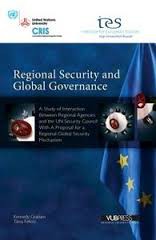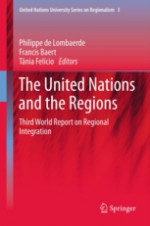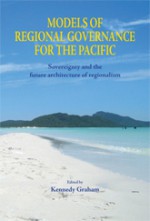Regional Security and Global Governance: A Study of Interaction Between Regional Agencies and the UN Security Council with a Proposal for a Regional-global Security Mechanism

A Study of Interaction between Regional Agencies and the UN Security Council; With a Proposal for a Regional-Global Security Mechanism.
Cover Regional Security and Global Governance
Under the auspices of the United Nations University (Comparative Regional Integration Studies, Brugge, Belgium) and in collaboration with the Institute for European Studies of the Vrije Universiteit Brussel (Free University of Brussels), Dr. Kennedy Graham and Tânia Felício wrote a compelling study of the interaction between regional agencies and the UN Security Council. They extended their study with a proposal for a regional-global security mechanism that may be of interest to policy makers worldwide.
“Regional Security and Global Governance” is a ground-braking exploration into how peace and security might best be attained in the 21st century. Its central message is the importance of realising UN Secretary-General Kofi Annan’s vision of a “regional-global security mechanism” within the next decade.
The book reviews the historical tussle between universalism and regionalism as the cornerstone of international security over the past century, culminating in the ‘new regionalism’ that has characterised international relations in recent decades.
The complexities of contemporary regional, sub-regional and other organizations, blessed and burdened with overlapping membership, evolving mandates, and even shifting ‘focal areas’ are analysed. The ‘multidimensional phenomenon’ of regional security is explored – cultural, political and legal – with a view to understanding how regional organizations work today.
The authors then offer a prescriptive proposal for helping to structure the future ‘regional-global security mechanism’, by identifying a series of ‘security regions’ around the world, and associated regional agencies that could be responsible for each region.
These agencies would take the lead in partnering with the UN in conflict prevention, peacekeeping, enforcement, and peace-building, as appropriate for each region. And such a future structure might have implications for resolving the continuing impasse over Security Council expansion, sometime in the future.
This book is one of those rare offerings – a policy-oriented prescription for peace and security that is based on factual analysis and creative reasoning. As such it is a must for national diplomats, regional officials and international civil servants..
Endorsements:
In 2003 the UN Secretary-General first presented his vision of a 'regional-global security mechanism' to handle the new threats and realities of the 21st century. This timely book is a path-breaking exploration of the changing character of the relations between regional security and global efforts to maintain international peace. It is full of empirical insight and intellectual vision.
Prof. Dr. Ibrahim GAMBARI, Under-Secretary-General of the United Nations
Other books by these authors
Featured Books
No featured books


